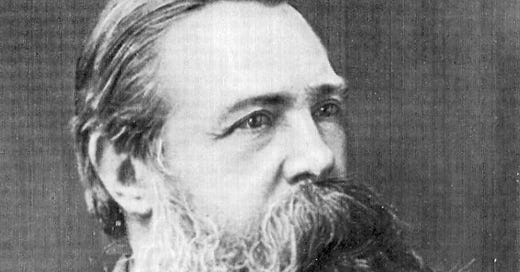Notes on Friedrich Engels (1884) on "The Relative Autonomy of the State"
What was Friedrich Engels doing here, in 1884, in trying to shape the direction of the socialist movement that was the Second International?...
What was Friedrich Engels doing here, in 1884, in trying to shape the direction of the socialist movement that was the Second International?...
Glossing the Communist Manifesto’s “Die moderne Staatsgewalt ist nur ein Ausschuß, der die gemeinschaftlichen Geschäfte der ganzen Bourgeoisklasse verwaltet”—“the power of the modern state is nothing but the associated management of the affairs of the business class”1. In 1884 Friedrich Engels expanded upon what he then thought he and Marx had meant back in 1848:
Friedrich Engels (1884): The Origin of the Family, Private Property & the State: ‘The state... is normally the state of the… economically ruling class, which… becomes also the politically ruling class… [with] new means of holding down and exploiting the oppressed.... The ancient state… of the slave-owners for holding down the slaves… the feudal state… of the nobility for holding down… peasant serfs and bondsmen, and the modern representative state… for exploiting wage-labor by capital… <https://archive.org/details/originoffamilypr1972enge>
But Engels in 1884 expanded on it only to then reveal that he found the Communist Manifesto’s 1848 express line inadequate for any productive discussion of what was, to him, the modern politics and political strategy of the Steampower Age.
And so in 1884 Engels issued very important qualifications. But what is left after the qualifications? Damned little.
Keep reading with a 7-day free trial
Subscribe to Brad DeLong's Grasping Reality to keep reading this post and get 7 days of free access to the full post archives.





